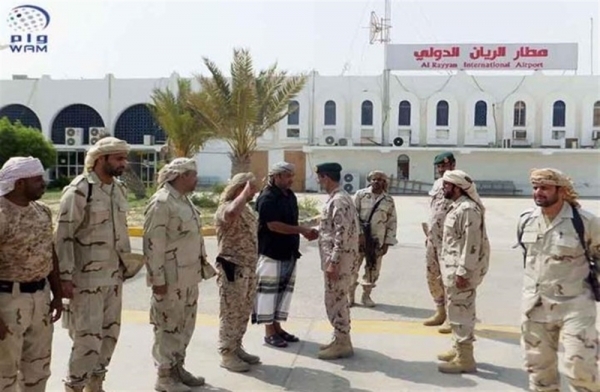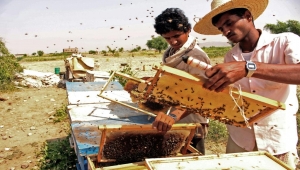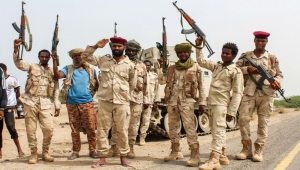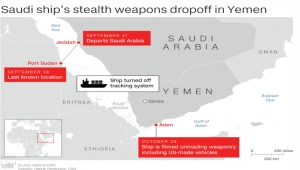
[ Al-Rayan airport in Hadramaut ]
A Yemeni detainee who was imprisoned for several months at Al-Rayan airport in Hadramaut, revealed about some form of torture by UAE officers inside the cells of the airport, which is supervised by UAE forces and has been turned into a prison since 2016.
The detainee spoke to "Almawqea Post" days after his release on condition of being anonymous because he was afraid to be detained or harmed again. He said that when the UAE forces released him, he was told that he will remain under surveillance and they warned him not to talk about what happened to him to the press.
The detainee, who belongs to one of the governorates where the UAE forces are present, gave details of the methods of torture that detainees suffered from during interrogation by Emirati officers, the charges against them, prison conditions and the conditions of prisoners.
The methods of torture revealed by detainee were scaring by sniffer dogs, pulling nails, sexual rape, insertion of tools in the rear of some detainees, torturing using electricity, solitary confinement, physical assault and denial of visit.
The UAE has been participating in the Saudi-led military alliance in Yemen since March 2015 to confront the Houthi group and support the legitimate government. Its forces were in Hadramout province in 2016 after Al-Qaeda left the city of Mukalla, the provincial capital.
Since its presence in the city of Mukalla, the UAE has tightened its grip on the city through its forces there. It has taken Al-Rayan airport and turned it into a military base and a detention center that includes hundreds of detainees arrested during the last period under various pretexts. These forces refuse to leave the airport and allow civilian flights to take off and land there.
The beginning of the arrest
The detainee, who requested anonymity, said that his arrest was in October 2018 by the Military Intelligence of the Second Military Region Command in Al-Mukalla, who held him for four days in a local prison without questioning or explaining the reasons for his arrest, and then transferred him to Al-Rayan airport which is held by the UAE forces.
At Al-Rayan airport, the detainee was placed in solitary confinement for six days without any interrogation by prison staff. At midnight on his sixth day, interrogators took him to an interrogation room after placing a cloth on his entire face and head.
An officer started the interrogation and told him that he was accused of belonging to and working with Al-Qaeda. The detainee told "Almawqea Post" that he was surprised by the charges and he responded to the interrogator by denying his links to Al-Qaeda, asserting that he worked in Hadramout when they were controlling the city like any other citizen and that he didn't have any relationship with it, explaining his personal status as an old man who has a family.
According to the detainee, he identified the interrogator from his dialect during the interrogation. He realized that he was an Emirati officer. He was also accompanied by a group of Yemenis who the detainee was able to identify them from their local dialects. He became sure of that due to the duration he spent in prison.
At the beginning of the investigation, the UAE interrogator asked him to confess that he belongs to Al-Qaeda affiliation and to sign a statement of confession that he was a member of Al-Qaeda and that he committed terrorist acts in return for reducing his prison sentence, unless he would be tortured to confess by force.
He explained that he replied to the interrogators that he had not committed an offense that would prompt him to confess, and renewed his words that he had no links with Al-Qaeda, and that he did not belong to the organization or work with it. He said:" At that moment my eyes were closed, I was surprised by hot water poured on my whole body until I lost consciousness. Then they poured cold water until I woke up and regained consciousness, and they came back to ask me to confess."
Investigation atrocities
He pointed out that the interrogation of detainees begins at one o'clock at night and continues until Fajr prayer, during this time the detainee's eyes are closed. After the interrogation is finished each detainee is returned to his place whether in solitary confinement or collective rooms.
He stated that he was beaten and flogged with wires throughout his body, kicked by the interrogators, and was insulted during his interrogation hours, which caused an affront to his dignity, contempt for his personality and psychological humiliation.
As he kept insisting on the denial of the charges against him and his refusal to confess and acknowledge what he did not commit, the detainee revealed that he was subjected one night to torture with electricity which was connected to his body for ten minutes and the interrogators were asking him to confess that he is a member of Al-Qaeda.
The torture methods continued during his interrogation, and in sadness the detainee said that interrogators removed the nails of his fingers and toes in a brutal scene in which pain, blood, screaming and crying were mixed without any mercy from the jailer.
The detainee adds that he was subjected one night to what he described as the most terrible and deadly torture. He said that he was taken out of the interrogation room with eyes closed to another room. He was surprised by the release of a group of four to six sniffer dogs that brutally attacked him, tore his clothes. It caused extensive wounds to his body and he was bleeding due to the dog attacks.
He said that his interrogation continued in the same way and treatment for more than thirty-five days. With every brutal torture method they repeated the same request to confess and he responded to them with the same answer that there was no crime committed and he denied his relationship with Al-Qaeda.
He was then placed in a solitary confinement cell for two months, a narrow room in a ground floor which he estimated to be one meter long, one and a half meters wide. He had two meals a day, one in the morning and the other in the evening with a cup of water in the afternoon. The prayer was forbidden for him and the rest of the prisoners by those in charge of the prison.
Two months after his solitary confinement, the detainee says that the prison administration transferred him to a collective room so called Anbar where there are approximately 36 prisoners, all of them are Yemenis, and were charged by interrogator with the same charge of belonging to Al-Qaeda.
Collective imprisonment
Leaving the solitary confinement was a rebirth for this detainee, as he describes it, and being with others in the collective prison allowed him to know other prisoners and listen to their conditions of imprisonment and what they went through in the cells of Al-Rayan airport.
The detainee revealed that there are people who have been arrested and imprisoned from public roads just because of suspicion of belonging to Al-Qaeda. They spent there months without being released or referred to competent judicial bodies.
He said that visits to prisoners were forbidden by the prison administration. When some relatives of prisoners came to ask about their relatives after they disappeared, the prison administration used to answer them that their relatives are not in the prison while they are inside. The detainee said that his family did not know anything about his detention and his fate and they used to come from time to time. Two months later, the prison administration told his relatives that he was in prison and allowed them to visit him.
The detainee told "Almawqea Post" about many methods and stories of torture suffered by prisoners inside Al-Rayan airport by the UAE forces that control it, which are a part of the forces operating in Yemen to combat terrorism in cooperation with the United States, according to media and security reports about the relationship of cooperation between the two countries.
The detainee revealed that there are prisoners whose bodies are suffering from wounds and purulence due to the bites of sniffer dogs during the interrogation and there are others whose teeth have fallen and people whose hands or arms have been broken, all because of beatings and kicking during interrogation in order to get confessions that they are members of Al-Qaeda.
He said that all the detainees were beaten with electric wires, and poured by cold and hot water on their bodies. He pointed to another method of torture by electricity, where the electric wire is put in the fingers of the prisoner's hands then the electricity is turned on, and the prisoner is thrown from place to another due to the electrical shock which is extremely painful.
There is torture by tying the feet on the roof of the room, the head of the prisoner down and sometimes the hands and legs are tied together and the prisoner hangs on the roof of the cell for hours and demanded to confess again.
The detainee also revealed that detainees have been sexually raped by soldiers and interrogators in the prison and others had Pepsi bottles inserted in their rear to force them to confess.
He spoke about the presence of many prisoners who spend long periods inside the prison without proving the charges against them. He said that the prison staff in the collective prison provide three meals for the prisoners, while water is provided from time to time. He adds, explaining the situation of detainees:"If you want to go to the bathroom, you are allowed once every 24 hours. Some prisoners were forced to urinate on themselves in the same place where they sleep inside the cell because of their inability to tolerate. Sometimes they give a bucket and force those who want to enter the bathroom to urinate inside it in front of the other prisoners."
Absent system and marginalized power
In his testimony, the detainee points to the absence of any role for the official agencies in Hadramout towards these practices, whether the judiciary, the prosecution or the local authority, pointing out that no one can talk about what is happening inside Al-Rayan airport, while the UAE officers control everything inside the prison and refuse to release prisoners who did not commit any felony and they do not have any clear case. Although the judiciary in the province returned to work, but they didn't bring the Emiratis to any court.
He clarifies that the Emirati official is the one who forbids, orders and governs himself by his mood. He became the judiciary, the court, the prosecution and everything.
He adds:"We were telling them that here in Yemen there is state, law and judiciary. Their response to us was: there is nothing for you here, no state, no judiciary and we are the judiciary and the prosecution, and you have nothing here."
He said that the Emirati officer, who appears in his thirties, is the de facto ruler in the coast of Hadhramaut, who manages the province while the governor, the command of the military zone and military intelligence do not have any influence or authority. This officer who directs and controls all everything even ports and business contained in the province according to his personal temperament.
Other violations
The detainee points out that the violations committed by the UAE forces in Hadramout are not only related to torture, enforced disappearance and restrictions on freedoms inside Al-Rayan airport prison, but that these forces have deprived the citizens of their livelihoods and income, taking in consideration banning fishermen to fish in the area of Shuhait - four kilometers from Al-Rayan airport - although it is the main source of income for fishermen, arguing that the area is near to the airport and no one should be there.
He said that the shepherds of sheep and cattle in the area near the airport were prevented from grazing and being there, justifying the security risk. He also said that some of the herdsmen were arrested and imprisoned for grazing their cattle, although they are not dangerous and used to be there in the past.
He revealed that one of the preachers in the region addressed his speech on Eid Al-Fitr on what the fishermen are exposed to, and as soon as he got out of the pulpit, Emirati crews came and took him to prison at Al-Rayan airport, and he was subjected to horrible torture for talking about the situation of the fishermen and what they are exposed to.
The detainee said that the UAE forces prevented the import of goods through the port in Mukalla, and they argue that the port is empty for the benefit of the coalition. The detainee also said that the forces stop the goods of some merchants in the port for up to twenty days and then they inform the merchants to go to the port of Hodeidah to take their goods, and this caused great suffering for merchants because of the high cost to go to the port of Hodeidah to unload the goods and this impacts on the prices of goods later.
He stressed that Al-Rayan airport has become an ugly prison in which the abuses that are practiced inside and outside are unusual. This includes the daily inspection of university students girls heading from Al-Shahr city to Al-Mukalla without respecting their privacy or customs and traditions.
He said that the arrests in Hadhramaut by the UAE forces also affected women for unknown reasons, and they were imprisoned at Al-Rayan airport. According to what the detainee said, the situation reached according to prostitution by Emirati officers with daughters and children in Al-Mukalla who were brought by Yemeni collaborators. The detainees in the prison are up to three thousand detainees as he said.
The story goes out
Regarding the story of his release from prison, the detainee said that this happened opposite to his expectation after the suffer he lived inside the prison. Emirati officers told him when he left that he was under surveillance and they would monitor all his movements.
He pointed out that there are prisoners released from time to time, but very few compared to the large number of prisoners inside the airport, calling on human rights organizations to interact with their cases and what they are exposed to.
لقراءة المادة باللغة العربية اضغط هنا


